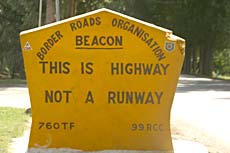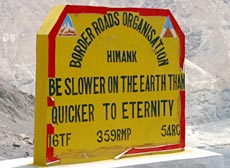Success key: Never give up (but be very quick to change). Turning $15,000 into $64 million. Kissing $64 million goodbye.
My Uncle Lou, who was in the construction business, once told me, "Show me a successful business person, and I'll show you someone who has been on their ass a number of times." What he meant, of course, is that most people who become successful do so only after failing several times. I certainly was not an exception to Uncle Lou's rule.
The ability to hang on when things are tough is mentioned in every "how to succeed" book or article. Most notable of all is probably Winston Churchill's famous "Never give up, never give in…" statement he made during England's bleak days in World War II.
You've got to be willing to change often.
Being able to hang on when there didn't seem to be a "light at the end of the tunnel" played a key role in both of my major entrepreneurial successes. But hanging on just for the sake of hanging might not get you very far. You've also got to be prepared to frequently change or modify what you're doing, so that hanging on through all the tough times actually accomplishes something — other than your demise.
I've been through a lot of difficult times.
At both Parsons Technology and GoDaddy.com I went through some very difficult times. There were times during both startups that I didn't see any possible way that what I was doing could succeed. Coupled with these dismal prospects was the fact that both times I was personally taking a financial beating. As if this wasn't bad enough, I also had to deal with all the "non risk takers" giving me that "that's too bad" look, or worse yet, shoveling patronizing sympathy my way.
Quitting is easy.
The easiest thing to do in the world is to quit and give up on your dreams (and quite frankly, that's what all the non-risk takers want you to do).
My vision kept me going.
What kept me going through the hard times was the vision I kept in my mind's eye and seldom let go of. This vision always dealt with the rewards of succeeding. While I thought often and long about what I needed to do to succeed, the vision that kept me going had nothing to do with the mechanics of success.
Money never motivated me.
Money is something that never motivated me with either business. Make no mistake, I like having money and I like what I can do with it. But money is not something that ever motivated me.
How the name Parsons Technology came about.
When I was trying to figure a way to make Parsons Technology work, my constant and personal "mind's eye" vision always had my company one day standing alongside other notable companies of the day. One of the companies that I thought was very cool was a hardware enhancement company named Orchid Technology. I liked their name and logo so much, that I sort of named my company after them. I did this by tacking the name Technology onto my last name, making Parsons Technology.
Laying in bed at night.
I used to lay in bed at night flipping through the pages of a prominent microcomputer magazine and looking at all the full page ads. I would see the ads placed by Orchid (always sharp), IBM, Digital Research and others. I would dream that one day my company would have full page ads right along side the other big players. I saw my company with lots of happy customers and very cool products. That was the vision that kept me going at Parsons Technology.
At GoDaddy.com the vision was a little different in scenario, but pretty much the same in substance. My Go Daddy vision was that one day everyone would know that GoDaddy.com was an internet company whose name meant very low prices, excellent products and outstanding service.
A "mind's eye" vision of success is critical.
For both Parsons Technology and GoDaddy.com, it was my "mind's eye" vision of success that kept me going through the hard times, and gave me the willpower to hang on. Without some sort of vision of success, similar to what I used, I don't believe that it's possible to succeed.
A willingness to change — and change often — is also imperative.
It would be nice if the willingness to hang on and a strong vision of success is all that's required to succeed. But that simply isn't true. You also must to be willing to frequently change what you're doing, and you must keep changing until you find that magic key that makes what you're trying to do actually work. Most likely, what finally proves to be successful for you will be far different than what you envisioned would work when you started. That's why you've got to be willing to modify what you're doing often. That way you will significantly increase the likelihood that you will one day iterate over to something that actually works.
Nothing works the first time.
I personally cannot think of too much that I've tried to do in either business that worked the first time I tried it (this is pretty much still true today for me). It is particularly true for starting any new business. It's difficult to get a business to work so that its products or services are actually purchased by consumers — who are requested thousands of times in all sorts of ways, each and every day, to buy other products.
An important key to success.
So just how does one succeed? You do so by hanging tough, continually trying new things and changing what you're doing until you find what works. The path to success is iterative and the stepping stones are called failures. You need to be quick to quit doing what isn't working, and keep doing what seems to be working. This I promise is a lot harder than it sounds, but it can certainly be accomplished. (If I did it twice from scratch, anyone can do it.)
Each and every failure is valuable.
I like to think of failures as learning experiences, or lessons. After all when you do something that fails, the one thing you know for sure is that what you did and the way you did it, didn't work. Over time that knowledge becomes incredibly valuable.
Thomas Edison failed often.
There's an old story about Thomas Edison that emphasizes this very point. It happened while he was trying to develop the dry cell battery, and had failed thousands of times. During an interview, a reporter commented that he must be very discouraged after so many attempts and coming away with nothing. Edison said that he hardly came away with nothing, because in fact, he now knew thousands of ways "not to build a dry cell battery." Edison, of course, went on with his attempts and eventually invented the dry cell battery.
I failed early and often with Parsons Technology.
My attempts to get Parsons Technology off the ground were similar in some ways. I tried all sorts of things early on to sell my MoneyCounts home accounting software. I tried selling it at different price points. First it was $99, then it was $69, then it was $49 and eventually $12. I tried selling it through small magazine ads. I also tried to sell it retail. I even tried to get it to sell through network marketing. Nothing worked. In fact, there was one time when I took every last bit of cash I had and purchased a quarter page ad in a popular magazine for the day. The ad cost me $3,000. After the ad appeared in the magazine, I received a total of about $100 in sales. You can be sure I learned not to do that again.
Cinderella was on my side.
When I started Parsons Technology, I did so with a desk in my basement and an IBM PC which I named "Cinderella." I had $15,000 to get the company going. It was made up of cash and credit available on my Visa and MasterCard. When I debuted with small ads, and priced the product at $99, nothing happened. In fact, I was so sure that I was going to get lots of orders that I hired an answering service to cover my phone and take the orders when I was sleeping, or otherwise unavailable. To my chagrin, I didn't get one order. Not a one. I couldn't believe how much I missed the mark. Nevertheless, the vision I had of succeeding kept me going and I never gave up. Instead, I tried different approaches with the advertising, tweaking this and tweaking that. Nothing worked. I lost the entire $15,000.
I always paid my bills.
One thing I always did was pay my bills. Never did I leave anyone unpaid, and never did I pay anyone late. So whenever I ran out of cash (which was often) I would simply make the company inactive until I found more money. I could do this because my wife and I were the only employees, and worked for nothing. Because the office was in my basement, other than the basic charge on the phone bill, we had the luxury of no fixed expenses.
I spent very little time feeling sorry for myself.
My sources of cash were savings, paychecks from my regular job, tax refunds, and credit cards. During the downtimes, I would stay busy working to make the company succeed. I would work on improving my software. I would also spend considerable time thinking about what I would do next. I spent very little time looking back or feeling sorry for myself.
I started again the next year with $25,000.
The following year I came into $25,000 and was able to get the company going again. I got this money from three sources. The first, and most significant source, was a bonus from my full time job. The second was from the tax refund associated with the earlier loss. And the third was from what I could squeeze aside from my paychecks after paying my bills.
Once again I lost it all.
So with plenty of cash (at least for me), and the software significantly improved, I went to work once again to make the company work. This time I dropped the price to $69 and then to $49. I purchased different types of magazine ads. I even paid to have retail packaging designed and printed. I used the packaging to give MoneyCounts a nice presence when I tried selling it at trade shows and through network marketing. In contrast with the previous year, I managed to sell a few hundred copies of the software, but nothing I tried actually made money. Some things worked a little bit, other things didn't work at all. Once again, I learned quite a bit about how not to market software. Eventually, and before that year was over, I lost the entire $25,000, and my little company became substantially inactive once again.
One of the biggest challenges.
Failing at anything can leave one feeling very alone. The biggest challenge to overcome when mitigating failure, comes from friends and family. Because I was always working either on my regular job or trying to make Parsons Technology work, I was just about always unavailable for getting together with friends and other activities. And because I continually put all my extra cash into my little company (and lost the cash) my family didn't do much outside of simply living our normal lives.
The "non-risk takers" never understand.
People who are not risk takers (this pretty much includes over 95% of the population) cannot fathom taking a chance to make a business work, and not having it immediately take off. They especially cannot understand being involved in something that fails repeatedly, and instead of giving up, trying to make it work (while risking all of one's financial worth) again and again. In similar fashion my friends and family, with a few rare exceptions (one of which was my dad, the other was my wife), did not understand why I kept investing all my time and money to make something work, despite the fact that it failed again and again. My secret — what I knew that the "non-risk takers" would never comprehend — was that money had nothing to do with it.
No one works really hard just for money.
Making money was the thing I thought about the least. The vision that kept me going was to build a successful company that had great products, was loved by its customers and respected by its peers. I believe that if I had simply been attempting the business to make money, it never would have been successful. No one works as hard as I did for money.
When you love something, it tells you all its secrets.
I worked as hard as I did because I loved the idea I was working towards creating. My father told me once (what a wise individual he was!) that for anyone to be excellent at what they were doing, they had to love it. He said that if you didn't love you job, you would never be better than average. When I asked him why this was the case, he told me something I would never forget. He said, "When you love something, it tells you all its secrets." This always made a lot sense to me. Those who love what they do, spend the extra time to learn the subtle nuances and all the not so obvious things that overall make a tremendous difference. The secrets I would soon discover were what made Parsons Technology come alive.
I kept going into the 3rd year.
After going broke the second year, I continued to work on the software day and night. I also was obsessed with coming up with a way to sell it. The product was now excellent. Anyone who tried it, loved it. But since this was such a small number of people, other than getting positive feedback (which I sorely needed) — it didn't generate much in the way of cash. I eventually accumulated a few thousand dollars through isolated sales trickling in from here and there, and from paycheck savings.
Excellent credit allowed me to take a big chance.
Because I always paid my bills and paid them on time, I had excellent credit. An opportunity came available at the last minute to purchase a full page ad, using two colors, in a small, now defunct magazine called The Computer Bargain Line. Unbelievably, the ad was on the front cover of the magazine (try buying the space on the front cover of any magazine today, things were very different back then!). Because I had good credit, I was able to take advantage of that deal. And because I had a few thousand in cash, I was able to pay to have a local advertising firm quickly produce the ad.
A drastic change in price and marketing made the company.
In putting the ad together, I decided that it was time to try something drastic. I lowered the price of the software to $12. I thought that when seeing the product advertised in a full page, 2 color ad, the product would have credibility. And because the price was a low $12, price wouldn't be a factor at all in making the buying decision. It would be an impulse purchase. To get the point across, the advertising firm came up with the headline "MoneyCounts….But in only costs $12!" Unlike every other I idea I had since starting the company, this time I was right. The ad not only worked, it worked in spades. I tripled my money, and more importantly, accumulated hundreds of new customers.
Then I tried direct mail.
I then did something else that would prove to be the big idea that turned Parsons Technology into a $64 million dollar success. I tried selling using direct mail. Over the years I accumulated a mail list of thousands of names. The list was the result of people that seen my many small ads (that really didn't work) and who simply wanted information on the product being offered.
I broke every direct marketing rule.
I had brochures printed that were nothing more than copies of the successful two color full page advertisement I just ran. I printed out labels for all those names, and my entire family (myself, wife, and three children) put labels on the envelopes, licked stamps (I sent them all first class —- at that time I didn't know about bulk mail) folded the brochures, put them in the envelopes, and licked them shut. I licked so many envelopes and had so much glue on my tongue, that I don't think I talked normally for at least two days.
Nothing has ever worked for me as well as that first mailing.
We hauled the envelopes over to the local post office, sent them on their way and waited. During the first few days after the mailing, we received a couple of orders back in the mail and over the phone. So I thought that maybe direct mail wasn't a good idea. Then something exceptional happened. We started receiving orders by the hundreds. In fact, we received over 3,000 orders from that mailing (which would have been over a 30% response). To this day, I received a better response from that first mailing than from any subsequent mailing I ever did.
Direct marketing became my specialty.
Parsons Technology then became a company that sold its software products using direct response marketing from magazine advertising and direct mail. The formula that worked was offering appealing products at very low prices, coupled with strong guarantees and excellent customer service. It was also necessary to offer products in a format that conveyed credibility. This was typically accomplished through four color advertisements, accompanied by charts comparing price and features with competitive products.
Sales create more sales.
As sales continued to grow, I learned something else incredibly important that helps me to this day. When customers purchase something from you, and have a good purchasing experience, they become eager to purchase something else from you. In this respect sales create more sales, and if handled properly, your customer base becomes a wonderful source of repeat sales. Best of all, because there is no advertising to purchase to reach your customer base, it is very economical to market to them, and the resulting sales are your most profitable.
I decided to quit my day job.
Realizing the opportunity, I went to work to create products in addition to MoneyCounts. The product that my new customers asked for was software to complete a personal income tax return. So I went to work to create one. At that time I was still working two jobs. I was working full time at my regular job and also full time at Parsons Technology. As you might guess, I got very little sleep. Since there was no way I could write the new software and do both jobs, I quit my job at the leasing company.
A tough decision.
Quitting my full time job was a tough decision for two reasons. First, I was walking away from a job I knew how to do and was quite successful at. The job paid well, and was within a 15 minute drive of my house. In essence I was giving up my safety net. Second, it was early October and I had a bonus agreement in place that provided a generous bonus. I had already earned the bonus — all I had to do to get the money was to be employed on December 31st of that year. The bonus would be in the neighborhood of $30,000. Since staying at the leasing company for that additional two and half months meant I wouldn't be able to complete my new tax software, I decided to forget about the bonus, and quit. I was able to make this decision because it was never money that motivated me; I was interested in building a successful company. My wife at that time, to her eternal credit, understood the implications of this decision, and supported my decision to quit and devote all my time to Parsons Technology.
Getting our first real office.
I worked around the clock at Parsons Technology, and although I shipped it late, I was able to write a tax software program that worked. The company made about $50,000 on the tax software, despite shipping it a month late. And bang! We were now in the tax software business. It was at this time that we moved out of the basement and got our first real office.
I hired inspired and excited engineers.
I continued to develop and add new products whenever I had the opportunity. To do so, I started hiring software engineers. Whenever I met someone who appeared to love developing software, I hired them. I never paid much attention to whatever formal education they had. Instead, I was more interested in what they knew about writing software and I looked for that light in their eyes that always seemed to be there when they had a passion and excitement for what they were doing.
Our development effort was second to none.
Eventually, the development effort at Parsons Technology was second to none. When I sold the company, we were shipping a new product or major upgrade every 5 and a half calendar days. When compared to the software development efforts in Silicon Valley, our cost to develop software was 1/3 of what they were doing and our error rate (measured in terms of bugs found in shipped software) was also 1/3 of what they were doing.
My vision came true.
Parsons Technology's customer base grew to over 3 million names and we had close to a 4% share of the North American software market in terms of units shipped. Our employee count grew from just Martha and myself working in the basement, to almost 1000 employees. The company made money, usually a significant amount, each and every year after I moved it out of the basement. Martha and I sold it to Intuit in 1994, ten years after I started it, for $64 million dollars. By any measure, Parsons Technology would have to be considered a success.
So you see, it was constantly trying new things and modifying what I was doing that made the company work. And it was hanging on, never giving up despite some very tough times, until I was able to discover the secrets to being successful. It was pretty much the same thing with GoDaddy.com.
My ex-wife deserves a lot of the credit for making Parsons Technology a success.
My first wife helped me make Parsons Technology a success. In addition to being a wonderful mother to our children, she always worked as hard as I did. She supported me every step of the way. In fact, she was always there with moral support when no one else believed that what I was doing made sense. There's no doubt in my mind that if Martha was not by my side, Parsons Technology would never have been the success it eventually became.
Kissing the $64 million goodbye.
As for the $64 million, I used my share to start GoDaddy.com and get it off the ground. I also took a pretty good beating in the stock market when the dot com stocks crashed. But that's another story that is best told in an earlier blog article titled, "The temptation to quit will be greatest just before you are about to succeed. Parking cars for a living."
The above was taken from Bob Parson, CEO and Founder of GoDaddy.com 's blog : http://www.bobparsons.com/SuccesskeyNevergiveupbutbeveryquicktochangeTurning15000into64millionKissing64milliongoodbye.html




















